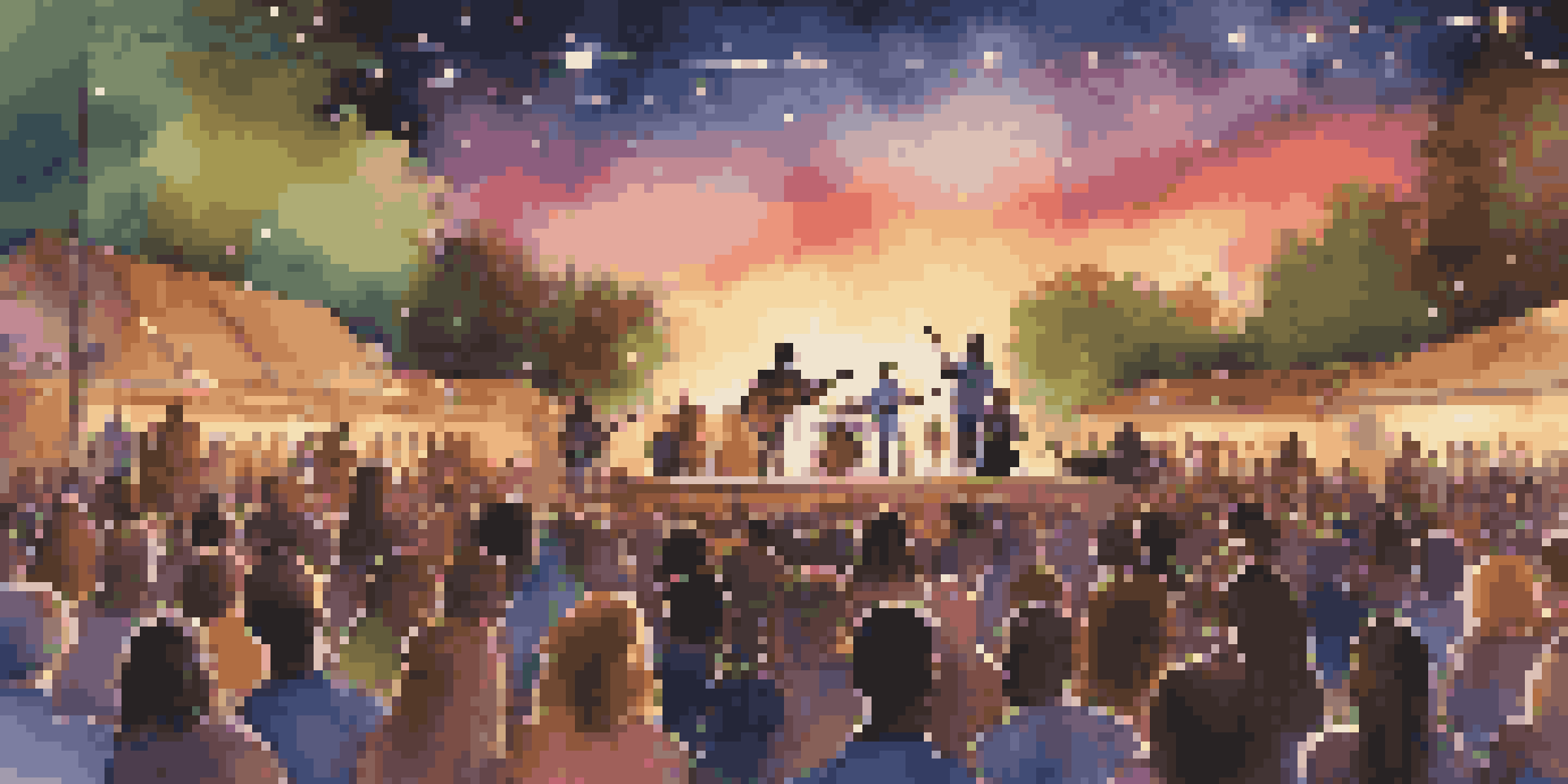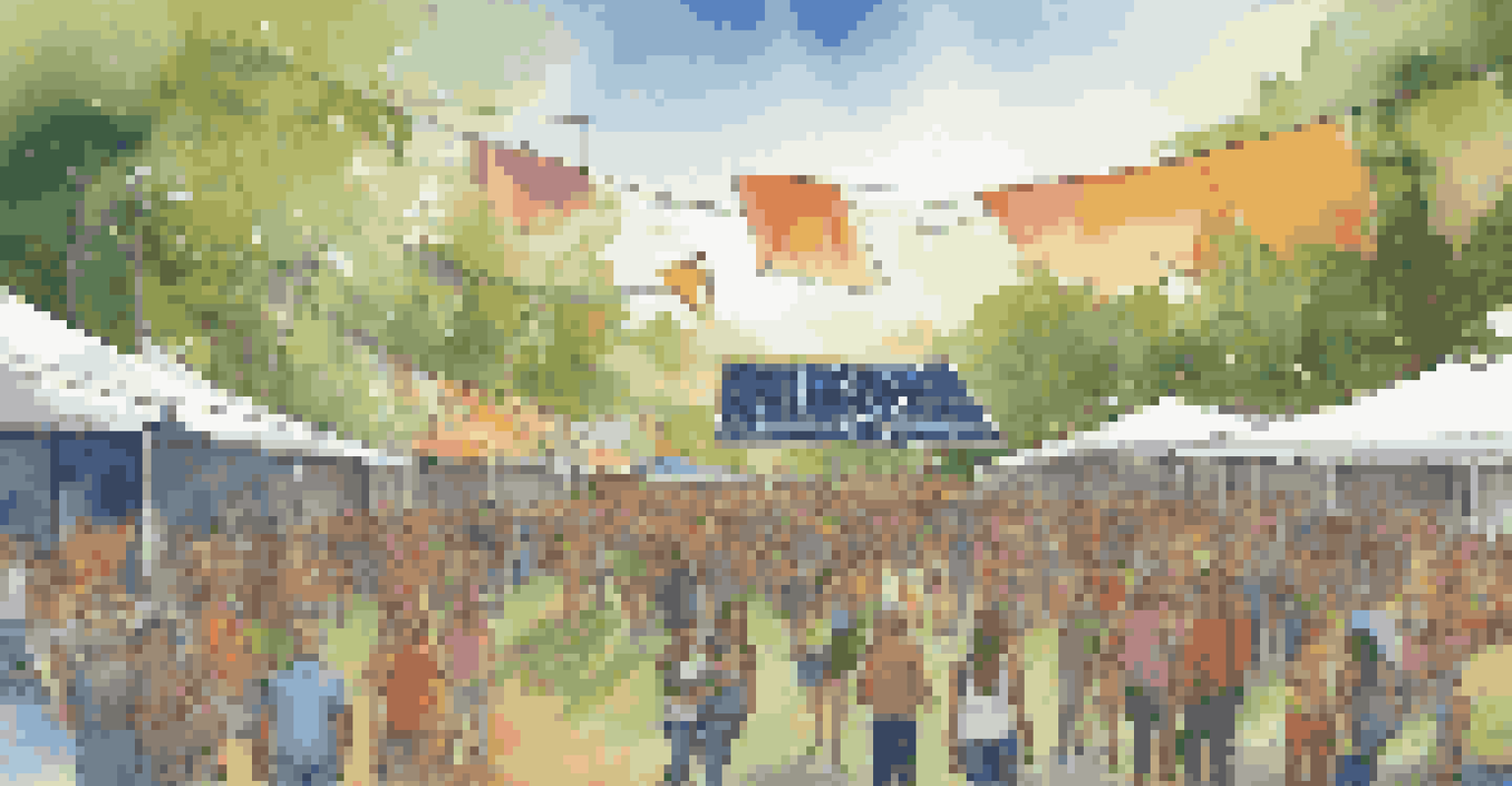The Impact of Technology on Live Music Experiences: Trends

The Evolution of Live Music Through Technology
Over the years, technology has transformed live music from simple gatherings to spectacular events. Gone are the days when musicians solely relied on their instruments and vocal skills. Today, sound engineering, visual effects, and advanced stage setups have become integral parts of the experience. This evolution has not only enhanced the quality of performances but also made them more accessible to a wider audience.
Technology is best when it brings people together.
For instance, think about the last concert you attended. The stunning light displays and intricate soundscapes likely left you in awe. These enhancements are made possible by cutting-edge technology that helps artists deliver unforgettable performances. Additionally, this shift allows for greater creativity, enabling artists to experiment with their sound and visuals seamlessly.
As we look forward, it’s exciting to imagine how technology will continue to shape live music. With innovations constantly emerging, artists and audiences alike can expect even more immersive experiences. The blend of traditional music with modern tech creates a unique landscape that redefines what it means to enjoy a live show.
The Rise of Virtual Concerts and Livestreaming
Virtual concerts have gained significant traction, especially in light of recent global events that limited in-person gatherings. With platforms like YouTube, Facebook, and Twitch, artists can reach fans without geographical constraints. This trend not only allows for broader audiences but also creates a new revenue stream for musicians and venues alike.

Imagine being able to attend a concert in your living room, wearing your pajamas but still enjoying an electrifying performance. Livestreaming has made this possible, offering fans a chance to connect with their favorite artists from the comfort of home. Moreover, these virtual events often include interactive elements, such as live chats and Q&A sessions, enhancing the viewer experience.
Tech Transforms Live Music Experience
Advancements in technology have enhanced live music, making performances more accessible and immersive for audiences.
As technology continues to advance, we can expect even more innovative approaches to virtual concerts. From 360-degree live streams to augmented reality (AR) experiences, the potential for immersive entertainment is vast. This shift not only benefits artists but also opens doors for fans who may not have access to live events due to distance or other barriers.
Enhancements in Sound Quality and Equipment
Sound quality has come a long way, thanks to advancements in audio technology. High-definition sound systems and innovative mixing techniques ensure that audiences experience music as intended by the artist. This evolution is crucial in live performances where every note matters, and clarity can make or break the experience.
Music can change the world because it can change people.
Consider the difference between a live concert with standard speakers versus one equipped with top-of-the-line audio technology. The latter transports you into the heart of the music, allowing you to feel the vibrations and nuances of each instrument. This level of experience keeps fans coming back for more, as they crave that emotional connection facilitated by superior sound.
Looking ahead, we can anticipate even more enhancements in sound technology. Innovations like spatial audio and soundscaping techniques will likely redefine how we perceive live music. With each advancement, the goal remains the same: to create an unforgettable auditory experience that resonates with fans long after the concert ends.
Interactive Audience Experiences with Technology
Technology has revolutionized how audiences engage with live music. From mobile apps that allow fans to vote on setlists to interactive displays during performances, the concert experience has become increasingly participatory. This shift enhances the connection between artists and fans, creating a vibrant atmosphere that fuels excitement.
Imagine being at a show where you can influence the playlist in real-time. This level of interaction not only empowers fans but also makes them feel part of the experience. Artists benefit from this engagement as well, gaining insights into their audience's preferences and fostering a sense of community.
Rise of Livestream Concerts
Virtual concerts have expanded the reach of artists, allowing fans to enjoy performances from anywhere with interactive elements.
As we move forward, we can expect even more innovative ways to engage audiences. Technologies like virtual reality (VR) and augmented reality (AR) could allow fans to experience concerts in entirely new ways. These advancements will continue to shape the landscape of live music, making it more inclusive and interactive for everyone involved.
Social Media's Role in Live Music Promotion
Social media has become an essential tool for promoting live music events. Platforms like Instagram, Twitter, and TikTok enable artists to reach their audience directly, creating buzz and anticipation around upcoming shows. This direct line of communication allows for a more personal connection between artists and fans.
Think about how you often discover new music or upcoming concerts through your social feeds. With just a few clicks, artists can share behind-the-scenes content, sneak peeks, and even live updates during performances. This strategy not only builds excitement but also cultivates a loyal fanbase eager to support their favorite artists.
As social media continues to evolve, its role in promoting live music will only grow. The integration of features like live streaming and interactive stories can further engage audiences, making them feel part of the journey. Ultimately, this trend illustrates how technology and social media work hand in hand to enhance the live music experience.
The Influence of Data and Analytics in Event Planning
Data and analytics are playing an increasingly vital role in the planning and execution of live music events. By analyzing audience preferences, ticket sales, and social media engagement, event organizers can make informed decisions that enhance the overall experience. This data-driven approach helps ensure that every aspect of the event aligns with what fans want.
Imagine being able to predict which songs will resonate with the audience or which venues are likely to sell out. This level of insight allows artists and promoters to tailor their performances to meet the expectations of their fans. As a result, events become more engaging, and attendees feel a deeper connection to the music.
Sustainability in Live Events
The live music industry is increasingly adopting eco-friendly practices through technology, reducing environmental impacts.
Looking ahead, the use of data in live music will only become more sophisticated. With advancements in technology, real-time analytics can provide organizers with immediate feedback during events. This capability allows for quick adjustments, ensuring that every concert is optimized for maximum enjoyment.
Sustainability and Technology in Live Music Events
Sustainability has become a crucial consideration in the live music industry, and technology is leading the way in creating greener events. From energy-efficient sound systems to digital ticketing, many artists and event organizers are adopting eco-friendly practices. This commitment not only reduces the environmental impact but also resonates with audiences who value sustainability.
Consider the benefits of digital ticketing; it eliminates paper waste and makes entry more efficient. Additionally, many festivals are exploring renewable energy sources to power their stages and lighting, showcasing a commitment to environmental responsibility. This shift not only enhances the festival experience but also sets a precedent for future events.

As technology continues to evolve, we can expect even more innovative approaches to sustainability in live music. The integration of smart technology can help monitor energy usage, optimize resources, and reduce waste. By embracing these advancements, the live music industry can create memorable experiences while prioritizing the planet.
The Future of Live Music: A Tech-Driven Landscape
Looking ahead, the future of live music is undoubtedly intertwined with technology. As we've seen, innovations in sound, audience engagement, and sustainability are reshaping the way we experience music. This tech-driven landscape promises exciting possibilities for both artists and fans as they navigate this new era.
Imagine attending a concert where you can choose your perspective through a VR headset or interact with the performance using AR features. These advancements will not only enhance the experience but also create a more immersive environment that blurs the lines between reality and technology. The potential for creativity and exploration is endless.
Ultimately, the fusion of technology and live music represents a vibrant future filled with possibilities. As artists continue to embrace these innovations, audiences can look forward to unforgettable experiences that push the boundaries of traditional concerts. The journey ahead is one of collaboration, creativity, and connection, ultimately redefining what live music means in the modern world.